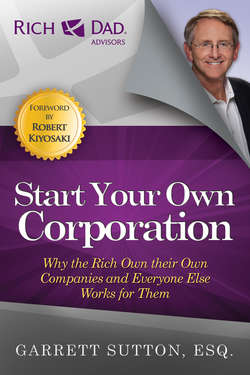Читать книгу Start Your Own Corporation - Garrett Sutton - Страница 11
На сайте Литреса книга снята с продажи.
Case No. 2: Louise
ОглавлениеLouise had worked for someone else all her life. For the last ten years she had worked in the gift section of a large department store. She did not like the floor manager insisting she do things a certain way when she knew her way would generate more sales for the company. It was all petty politics. She looked forward to the day when she could open her own business and make her own decisions.
Then one day, Maxine came to work at the department store. The two of them hit it off immediately. Maxine had a certain style and attitude that appealed to Louise. They had similar interests, the same feel for what the customers wanted, and the same desire to escape working for a faceless corporation filled with narrow-minded managers who stifled their every idea for improvement. Soon they were talking about opening their own gift boutique.
Louise had managed to save $10,000 to pursue her dream. Maxine did not have any money to contribute, but convinced Louise that she would contribute her first $5,000 in profits back into the business.
Louise was not aware that agreeing to form a partnership with Maxine without getting a written agreement as to distributions meant that they were automatically 50-50 partners. While Louise put up all the money and Maxine orally agreed to put her profits back later, the law treated them as each owning 50 percent of their new business, L&M Gifts.
In nine businesses out of ten there are problems when only one partner puts up all the money. L&M Gifts was no exception.
Maxine wanted the store to have the right atmosphere. She decided on leasing a storefront in a nice area and obligated the partnership to a three-year lease at an above-market rate. She decided on stylish tenant improvements to achieve the right look for her dream store. She then obligated the partnership to buy a large quantity of gifts in order to stock the store.
Before L&M Gifts opened its doors the partnership had obligated itself to spend $12,000 on improvements. They were also obligated to pay $1,500 per month in rent for the next three years. Louise was not aware of these transactions. However, as general partner, Maxine could obligate the partnership without informing or getting the approval of her other partner.
Louise wanted to announce their grand opening by placing an ad in the newspaper. Because they were a new business, the paper wanted a check up front. When Louise went to write a check it hit her. They were out of money. Maxine had spent Louise’s entire $10,000, and then some, to open the store.
When Louise confronted Maxine with this Maxine was unconcerned. She asked Louise if she could put up any more cash. But Louise did not have any more money. Her life savings, her dream of her own business and control of her future, was the $10,000 that Maxine had already spent.
Maxine said she did not have a credit card but asked if Louise had or could get a credit card to help them get over this hump. Maxine said that if they could just get the doors open together they would be rolling in profits. It was with this comment that Louise realized that she was putting up all the money and taking all the risk so that Maxine could share in all the profits.
Louise was shaken by this realization but remained composed. She said she did not have a credit card nor did she have good enough credit to get one.
At this, Maxine flew off the handle. She said that she had invested all her ideas of style and atmosphere into the business. All Louise had to do was put up the money. She was furious that her creative vision for L&M Gifts was to be dimmed by Louise’s refusal to put in more money.
Louise was stunned by her partner’s reaction. She had put her life savings into the business. Maxine, without telling her, had squandered it. And now Maxine was angry that she could not put in more.
As one would expect, things soured very quickly between the two. As soon as Maxine learned that no more money was forthcoming, she reignited a relationship with an old boyfriend who lived two thousand miles away. She picked up and left town within forty-eight hours. No one heard from her again.
Louise was left with all the bills. Because Maxine had obligated the partnership, even though Louise had no knowledge of such obligations, Louise as the remaining general partner was personally responsible.
The landlord, the contractor who did the tenant improvements, and the suppliers of the inventory all sued Louise. While Maxine was equally responsible (if not more so) for these debts, the creditors did not even bother to pursue her. She had no money and she was on the other side of the country. Why would someone spend the time and money to chase her? The sole burden of the partnership’s debts fell upon Louise.
